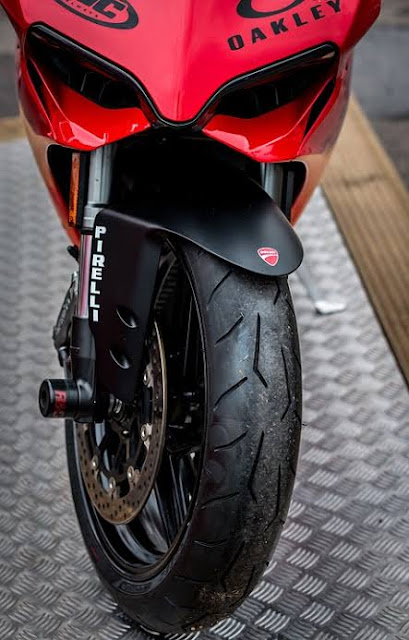5 Fantastic Facts About Motogp Bikes
Motogp is the top division of racing events organised by Fédération Internationale de Motocyclisme (FIM), commonly known as International Motorcycle Federation. It is the governing body for premier racing events, commonly known as Grand Prix Motorcycle racing. These events are extremely popular world wide and have huge fan following. Motogp being the top division of these events, attracts the talent and technology from all over the world. Motogp motorcycles are technically advanced and far superior than the common superbikes. In this post we will discuss some interesting facts about these power beasts. So let's discuss one by one.
1. Motogp Motorcycles Are Not Available For Sale
Yes, you are reading correct, THE MOTOGP MOTORCYCLES ARE NOT AVAILABLE FOR SALE. You may love it, desire it, dream for it but you can not buy it. It is also illegal to ride these giants on the public roads. These bikes are specially built for the purpose of racing. They can attain a speed of 350 km/hr with in a few seconds. It requires a great amount of training and expertise to ride these motorcycles.
Also Read :
The Formula One Cars
Also Read :
The Formula One Cars
2. Huge Cost
This may surprise you but it's true. It costs up to 2 million $ to manufacture a Motogp motorcycle. Let's look at the factors responsible for this :
-These motorcycles are specifically built for the purpose of racing. Most of the component used in them are unique and hence cost more.
-These bikes are one of their kind. It means their manufacturer produces only one bike at a time. Hence each Motogp bike is different. Since they are produced one at a time, their manufacturing cost increases excessively.
-The manufacturing of these vehicles require very complex and intricate processes. Hence most of the manufacturing work on these bikes has to be done manually. Also, trained and expert workforce is required to perform these complex manufacturing processes. Hence the labour cost increases excessively.
-The advanced and the state of the art technologies used in these bikes increases the cost of these bikes excessively.
3. Engine
The engines of Motogp bikes are extremely powerful and may generate power up to 240-250 horsepower. As per the latest rules, two stroke engines are totally banned in Motogp. The maximum capacity of the engine can be 1000cc and the maximum bore dia. can be 81 mm. The engines are four cylinder and have V4 configuration. They have double over head cam shafts and 4 valves per cylinder. The 4 valves allow for better aspiration. The valves used in the engines are pneumatic, instead of spring loaded. This is because the spring loaded valves can not perform well at higher engine rpm ranges. The engine rpm of these bikes may reach as high as 17000 -18000 revolutions per minute. To keep the engine cool, water is used as coolant . This done to eliminate the chances of coolant spillage on the tracks, which otherwise could have been threat to the rider safety. The allowable fuel tank capacity of these bikes is up to 21 litres.
4. Chassis And Tyres
Chassis
Chassis is the main structure of any automobile. It is the support on which all other parts are mounted. The Motogp superbikes have either perimeter or trellis frame. Both these frames provide stiffness and stability to the bikes. They also limit the engine vibration to a large extent. The material of the frames is generally Aluminum. Some manufactures are also using Carbon fiber based composites, since they are light and strong. Some even go for steels as the steels are stronger than the Aluminium. Due to high strength, lesser amount if steel can be used to provide huge strength to the Chassis. This prevents the Chassis from being bulky and also reduces it's overall mass.
Tyres
 |
5. Sensors
The unmatchable performance and the huge power output of Motogp bikes is a result of a network of sensors. About 40-50 different sensors are fitted at various locations on the Motogp bike. These sensors continuously measure the required parameters and give feedback to the Engine Control Unit (ECU) or the rider. The features like Automatic Traction Control, Antilock Braking and Anti Wheelie Systems work on the feedback of these sensors. These sensors provided real time data and can be used for adjustments in the bike by the rider or the engineers. Some of the sensors has been mentioned below for your information:
1) Speed Sensors
Speed Sensors provide wheel speed data to ECU. Helps in functioning of ABS and Traction Control System
2) Gyroscopes and Accelerometers
Provide the data about vehicle's acceleration/deceleration and lean angles.
3) Track Position Sensor
These sensors detect the vehicle's position on the track and help to program the bike according to different turns on the track.
4) Engine Sensors
They include a group of sensors like Knock Sensor, Camshaft Position Sensor, Engine Oil Temperature Sensor etc. They monitor the different engine parameters and help in improving the overall engine performance.
So friends this was all I could tell you about the Motogp bikes. Although I have tried to cover most of the technical aspects of these bikes, but even than it is quite possible that some facts may have been missed. We would try to cover those facts in some other post. Till than good bye and take care.
So friends this was all I could tell you about the Motogp bikes. Although I have tried to cover most of the technical aspects of these bikes, but even than it is quite possible that some facts may have been missed. We would try to cover those facts in some other post. Till than good bye and take care.












Leave a Comment